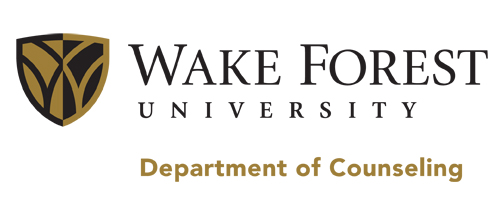Vision Statement
The Wake Forest Department of Counseling aspires to be a dynamic and engaging academic community that…
- Attracts a diverse community of scholars and students from across the country and throughout the world
- Employs the cohort model to integrate the knowledge, skills, and experiences of faculty and students
- Builds on established research and theories, current inquiries, and exemplary practices
- Creates service and research responses to meet current and future challenges to well-being and mental health
- Fosters a climate of critical thinking, ethical deliberation, and responsive action
- Honors the teacher-scholar ideal
- Models excellence in community leadership, advocacy and practice
- Collaborates with other academic entities
Mission Statement
(Revised 2017)
Faculty members collectively aspire to provide a rigorous intellectual climate and a supportive atmosphere encouraging personal and professional development to a diverse student body in order to prepare professionals who
- practice effectively and ethically;
- value diversity, diligence and life-long learning;
- excel as culturally competent practitioners, community leaders, and advocates;
- possess deep awareness of themselves and of their impact on others; and,
- engage in the compassionate service of humanity to foster the wellness of people everywhere.
Overall Program Objectives
(Revised 2017)
Faculty members strive for those aspirations by focusing on the following program objectives:
- Create a learning community that is respectful of student rights, responsibility, dignity and inherent worth by emphasizing excellence in teaching.
- Build a culture of accountability in which students demonstrate high professional standards for ethical behavior, clinical skill development, academic performance, interpersonal relationships, professional attitudes, and professional character.
- Provide curricular experiences for students to learn and demonstrate knowledge of the eight core standards designated by CACREP: (a) professional counseling orientation and ethical practice; (b) social and cultural diversity; (c) human growth and development; (d) career development; (e) helping relationships; (f) group work; (g) assessment; and (h) research and program evaluation.
- Engage students in activities that enable them to evaluate evidence, be open to new ideas and engage in the understanding and appreciation of the perspectives of others.
- Engage students in experiences in which they demonstrate an understanding of continual personal and professional growth.
- Provide experiences encouraging students to engage in compassionate service to humanity and foster the wellness of people.
- Provide experiences encouraging students and graduates to assume leadership roles by advocating for the profession.
- Provide excellence in supervised clinical experiences promoting professional and personal development throughout the clinical course sequence.
Clinical Mental Health Counseling Program Objectives
(Revised 2017)
In addition to the common program objectives outlined previously, the Clinical Mental Health Counseling Program has the following additional objectives:
- Students will engage in a continuous process of monitoring their growth and development as counselors through reflection and self-evaluation and will utilize opportunities to obtain feedback from peers and supervisors.
- Students will perform a wide range of therapeutic services among diverse client populations and in a variety of settings.
- Students will acquire the knowledge and skills needed to assess, diagnose (when appropriate), form case conceptualizations, and develop treatment plans for diverse client populations.
- Students will use evidence-based approaches that promote prevention, early intervention, wellness, and advocacy; taking into account the client, the environment, and the interaction between the two.
- Students will develop skills for working with clients dealing with substance abuse, suicidal ideation, crisis, disaster, and other trauma-causing events.
- Students will collaborate with teams of other mental health and medical professionals so as to provide the best possible care for their clients.
- Students will acquire knowledge and skills related to the operation of mental health services including public mental health policy, finances, regulatory processes, mental health service delivery systems, clinical mental health counseling services networks and advocacy.
School Counseling Program Objectives
(Revised 2017)
In addition to the overall program objectives outlined previously, the School Counseling Program has the following additional objectives:
- Students will engage in a continuous process of monitoring their growth and development as counselors through reflection and self-evaluation and will utilize opportunities to obtain feedback from peers and supervisors.
- Students will develop the knowledge and skills to design, deliver and evaluate school counseling programs that integrate and support the school’s overall mission.
- Students will learn to work effectively with the system of people who affect the lives of children such as parents, teachers, administrators, community service providers, legislators and others.
- Students will acquire knowledge and skills required for the functions of a school counselor who advocates for children. Those include counseling, coordinating, consulting, case management and design of a program that includes the guidance curriculum, individual planning, responsive services and system support.
- Students will demonstrate the competency to collect, analyze, use and disseminate data.
- Students will understand and appreciate the present and future needs of a pluralistic society and roles of schools and school counseling in enhancing the well-being of children in the world.
Learn about our efforts to improve diversity, equity, and inclusion in our program!
Department of Counseling News
See what’s been going on with our students, faculty, and staff in the department!
Podcasts
The Counseling Department produces a regular podcast series to highlight the research of its faculty, and to talk about various aspects of the Counseling program. Visit our Podcast page to hear more!
Webinars and Training Opportunities
We provide a listing of webinars and training opportunities as we become aware of them. Check back frequently!

